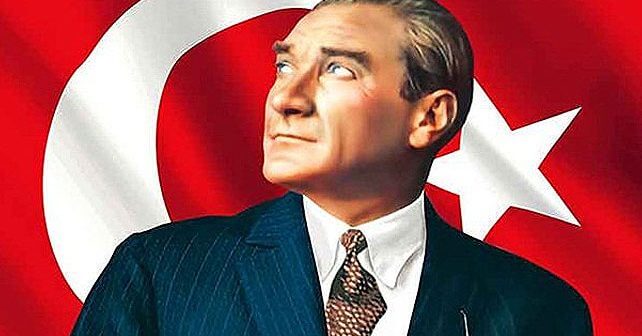Modern Turkey and the modern Balkans are peers, so to speak – twins. Turkey as it is today and the Balkans as we see it, were born at the same historical moment, in the years immediately after the First World War. Then the true closeness of Turkey and the Balkans was conceived, something more than friendship, perhaps even a real brotherhood. A relationship was conceived between them that had not existed for centuries before, even though they formed the same state – the Ottoman Empire.
Mustafa Kemal Pasha Ataturk, whom we especially remember these days, when the Turkey is celebrating 100 years of parliamentarism, has not only transformed Turkey. Part of his historical grandeur is that he has contributed to the transformation of the entire Balkans. What connected this great man and his great contemporaries in the Balkan Peninsula? What led these great men when they managed to bring Turkey and the Balkans together so much at one point, that after centuries of living in domination and subordination, they became true brothers, whose ties have not weakened after a hundred years?
History has arranged that in Turkey and the Balkans, at the beginning of the 20th century, appeared people who looked far into the future. They saw it just as it is today. It is a vision of open societies, ready to move forward, accepting positive influences from others. It is an awareness that we must constantly change if we are to remain who we are. It is the idea that neighbors are not a threat but a blessing of friendship and support.
By changing Turkey, Kemal Pasha changed the Balkans as well. The question is whether the Balkan visionaries of the early 20th century would have succeeded in emancipating and unifying their living space through the idea of community, had they not had enormous inspiration and role model in Turkey and its leader. The power and vision that Ataturk was using to change his country had echoed in the Balkans, where by then the tribes in war had stepped forward, reached out to each other and set out together to modernize their common habitat, bringing it closer to the developed societies of Europe and the world. In this joint step, as in the ballet “pas de deux”, the friendship of Turkey and the Balkans began, which was still close in Ataturk’s years, as a meeting of two twins, separated by life and brought together again.
„This attitude was personalized by the personalities of Ataturk and the first Yugoslav king Aleksandar, who did not spare words of respect and friendship for one another. Both were military leaders, they knew full well what the horrors of war meant, and they were given the opportunity to lead their nations at a time when it was not at all easy. Aleksandar of Yugoslavia expressed great respect for Kemal Pasha and his vision of a new Turkey, when he refused the invitation of Western Allied powers to send his troops to Turkey in 1921 to fight Ataturk, which the Turkish leader highly appreciated. “Yugoslavia has become a very strong state in the Balkans, with the Yugoslav people giving clear evidence of their right to create such a large state. Pre-war Serbia fought heroically against Austro-Hungary with success, even when the forces were not equal”, Ataturk spoke in 1923, and Belgrade press reported.
The two countries and two leaders worked hard to strengthen the alliance, which was crowned at the beginning of 1934, with the formation of the Balkan Alliance, which included Greece and Romania in addition to Turkey and Yugoslavia. In the meantime, leaders exchanged words and gestures of friendship, and Turkey’s gift to Yugoslavia was particularly striking, a large piece of land in the residential part of Ankara, where Yugoslavia built the embassy and residence, a copy of the royal court from Belgrade. It is still the most beautiful and impressive Serbian diplomatic mission in the world today.
The departure of Aleksandar in 1934 and Kemal Pasha four years later did not mean breaking the friendship between Yugoslavia and Turkey. On the contrary. It will be shown that their vision will outlive them and oblige their successors. The leader of socialist Yugoslavia, Marshal Tito also had great sympathy for modern Turkey and its founder Ataturk. His visit to Turkey in 1954 was magnificent, the citizens of Istanbul and Ankara waved to him as he walked through the streets, and on the city palaces it said “Welcome” in Serbian! Just a year earlier, Turkey, Greece and Yugoslavia signed a strategically important friendship agreement, which was in fact a defense alliance, as it envisaged coordination of military commands. Given that both Greece and Turkey were already NATO members at the time, Yugoslavia was considered to have joined NATO de facto, although it has never formally been it’s member. Regardless of the fact that the end of the 20th century brought about the grave and bloody disintegration of the Balkan Yugoslav community, the good spirit of friendship and connection of the Balkans with Turkey was preserved, no matter which Balkan country it was. The foundation of these relationships, laid almost a century ago by Kemal Pasha, together with his Balkan partners and friends, is as solid today as it was on the first day. Serbia and Turkey are as close today as they were in the time of Aleksandar and Ataturk, their nations are sympathetic to one another, visiting more and more often, admiring the common historical heritage, but also doing business more than ever. Soon, with decisive support from Turkey, the construction of the Belgrade-Sarajevo highway will begin, which will be a symbol of new connections within the Balkans, but also a symbol of its new, strong links with Turkey. It will hold its foundations, much stronger than the concrete, a vision of community and closeness that Mustafa Kemal Pasha Ataturk had many decades ago.
